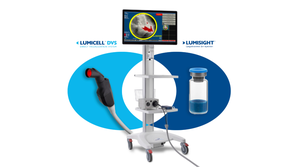May 9, 2017
Boston Scientific said its SmartCRT technology can help physicians optimize where, when, and how to pace the lower chambers of the heart.
Nancy Crotti

FDA approved Boston Scientific's Resonate family of implantable cardioverter defibrillator and cardiac resynchronization therapy defibrillator systems.
FDA has given the nod to a new line of implantable cardioverter defibrillators (ICDs) and cardiac resynchronization therapy defibrillators (CRT-Ds).
Boston Scientific's Resonate devices have technology that the company said helps physicians to quickly identify the best pacing location, vector, and timing for a patient's heart. They are compatible with the company's HeartLogic heart failure diagnostic service. Approved in 2016, HeartLogic's sensors evaluate a patient's breathing, activity and heart sounds to yield an index that can predict heart failure.
ICDs keep track of the heart rate and deliver an electric shock to restore a normal rhythm if the heart beats too fast or too irregularly. CRT-Ds are designed to treat heart failure and life-threatening ventricular arrhythmias.
The Resonate devices address the three main barriers to dual left ventricle cathode pacing, Boston Scientific's chief medical officer for rhythm management, Kenneth Stein, MD, told Qmed in an email. In addition to helping physicians pinpoint optimal pacing sites during implant, their 17 pacing vectors offer back-up options for difficult cases and the opportunity to adjust therapy after implantation, depending upon a patient's response and changing needs, he added.
The Resonate devices also use the company's EnduraLife battery, which can last about 10 years for CRT-D devices and 13 or more years for ICDs on average, Stein noted. These projections are based upon the device longevity estimates of real patients being remotely monitored on Boston Scientific's Latitude patient management system, he said.
According to each manufacturer's latest product performance reports, more than 85% of EnduraLife-powered CRT-D devices are still in service after seven years. That compares with less than 50% for Abbott/St. Jude Medical CRT-Ds, and less than 5% of Medtronic devices over that same time period. EnduraLife batteries provide about 35% more capacity than Abbott/St. Jude's Quadra Assura CRT-Ds and Fortify Assura ICDs, and nearly 100% more capacity than Medtronic's batteries, Stein noted. Boston Scientific began using EnduraLife batteries in its CRT-D devices in 2008, and launched the EnduraLife brand in 2015.
The Resonate devices received the CE mark in February. Boston Scientific expects to enroll more than 3,300 patients in the SMART Registry, SMART CRT study, and SMART MSP trials for the devices at nearly 300 sites globally within the next 24 months.
"These trials will add to the body of evidence showing CRT therapy can be tailored to individual patient characteristics at the time of implant, while adjusting device programming solutions over the life of the device without fear of adversely draining the device battery and causing unnecessary replacement procedures," said SMART CRT principal investigator Michael Gold, MD, of The Medical University of South Carolina, Charleston, in a statement.
Nancy Crotti is a contributor to Qmed.
[Image credit: Boston Scientific Corp.]
About the Author(s)
You May Also Like


